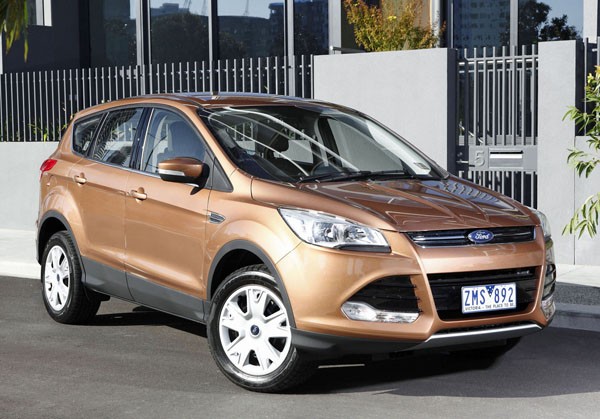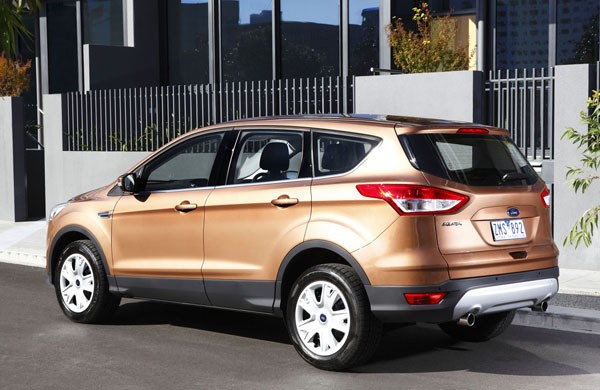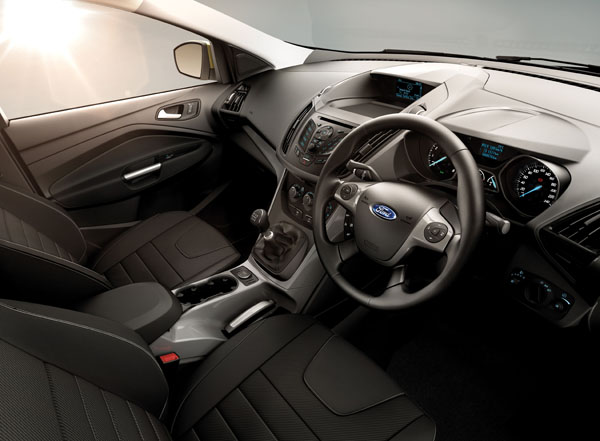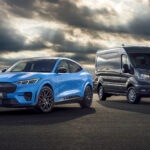
Just over a year ago, in February 2012, Ford Australia took a toe-in-the-water step by introducing its first Kuga SUV models. The first-generation Kuga was already approaching its fifth birthday in Europe, but Ford’s downunder people knew their Escape SUV was fading in popularity due to its age and outdated looks.
An ever-increasing number of more stylish competitors in what was becoming the most crowded sales arena in Australia meant a new, more modern Ford SUV was desperately needed. After what must have been a long, slow wait the all-new Ford Kuga is finally on sale here.
So important is the launch of the Kuga to Australia that Eric Loeffler, the global chief engineer of the Kuga project, came downunder. Over the dinner after the formal presentations, and during the drive program the next day, Loeffler impressed me with the attention to detail that has obviously gone into the design.
 Though Ford was keen to retain the practicality of the Ford Escape – with its sensible, boxy, not exactly inspiring looks – the stylists were well aware the medium SUV market has now become part of the automotive fashion scene.
Though Ford was keen to retain the practicality of the Ford Escape – with its sensible, boxy, not exactly inspiring looks – the stylists were well aware the medium SUV market has now become part of the automotive fashion scene.
People no longer want to buy a practical 4WD to explore the great Australian outback, instead they are looking for a station wagon that can carry all sorts of family stuff – and look stylish in the driveway.
While the overall theme of the new Kuga’s body doesn’t really break any new ground its execution is excellent and we feel its right up at the head of the medium SUV pack in looks. The frontal shape isn’t unlike that of the Ford Territory and we are told it’s indicative of the next generation Ford products.

Ford has paid attention to complaints that the first Kuga was a little cramped in the rear seat and has not only expanded that area by stretching the length, but has also made the boot larger.
Kuga’s interior styling is bold, with large sporty looking dials and a centre stack that protrudes towards the occupants for ease of use.
Ford is pushing hard on the connectivity theme and, thankfully, is doing what it can to minimise driver inattention. While many drivers will continue to ignore safety warnings and take their attention off the road, the voice recognition system used to control many functions should significantly reduce the number of crashes.
A clever feature in the big array of safety features is Driver Alert. This looks not only for driver inattention, but also for signs of fatigue during long trips that are such a feature of Australian country driving.
Should you be unfortunate enough to be in a crash the topline models will ring 000 and get help by informing emergency telephone operators of your position using GPS signals.
Talking of crashes, the new Kuga, with seven airbags amongst a host of other damage minimisation features, has obtained the highest ever ranking in its class in European testing. It goes without saying it scored a maximum five stars in Australasian NCAP barrier testing.
Power for the gen-two Kuga comes from either a turbo-petrol or turbo-diesel engine. Both are at the head of their respective fields in performance and economy.
The 1.6-litre EcoBoost petrol unit provides up to 110 kilowatts of power and 240 Nm of torque, when fitted in the lower cost 2WD version of the Kuga. Power is increased to 134 kW, but peak torque remains the same, in 4WD variants.
The 2.0-litre turbo-diesel’s power output is 120 kW, with 340 Nm of torque.
Ford uses its standard model designations of Ambiente, Trend and Titanium for the gen-two Kuga. Ambiente is offered in low cost format with 2WD, the front wheels, at a recommended price of just $27,990. It also comes with AWD at $31,490. Trend and Titanium come only with AWD.
A full price list for all models is given at the end of this review.
Even the Kuga Ambiente is well equipped, with keyless start, cruise control with auto speed limiter, a leather wrapped steering wheel, steering wheel mounted audio and cruise controls, Sync in-car connectivity with voice control, single CD audio system that is USB and iPod compatible, 3.5-inch mono TFT screen, front and rear foglights, Bluetooth mobile phone integration, single USB port and Auxiliary port
To this the Trend adds 18-inch alloy wheels, satellite navigation, 5-inch colour TFT screen, leather inserts and bolsters, heated front seats, interior ambient lighting with multi-colour choices, tables on front seatbacks and active park assist.
Topline Kuga Titanium gains 19-inch alloy wheels, panoramic glass roof, bi-xenon headlights with automatic levelling and daytime running lights front and rear.
We tested a variety of models during a drive program in South Australia that took us from Glenelg, south into the scenic Fleurieu Peninsula and came away with the smoothness and quietness of the ride, even on tough Aussie roads that had seen better days. There’s strong torque through the six-speed gearboxes (manual or automatic in the 2WD petrol Ambiente, auto only in the others).
The handling during our brief initial drive of six different variants always felt safe and predictable. Should you approach a bend at a silly speed Ford has installed a range of electronic stability and traction aids that will do all they can to get you out of trouble.
Ford’s new Kuga is an impressive example of the latest in medium SUV thinking. Stylish, safe and sensible it should slice out a substantial share of the highly competitive medium SUV market.
The complete 2013 Ford Kuga range is:
Ambiente 1.6-litre petrol FWD five-door wagon: $27,990 (manual)
Ambiente 1.6-litre petrol AWD five-door wagon: $31,490 (automatic)
Trend 1.6-litre petrol AWD five-door wagon: $36,240 (automatic)
Trend 2.0-litre turbo-diesel AWD five-door wagon: $39,240 (automatic)
Titanium 1.6-litre petrol AWD five-door wagon: $44,470 (automatic)
Titanium 2.0-litre turbo-diesel AWD five-door wagon: $47,740 (automatic)
Note: These prices do not include government or dealer delivery charges. Contact your local Ford dealer for drive-away prices.











